How to batch resize images using PowerToys on Windows
Those who have to work with image files on a daily basis often have to resize them to fit the needs of their projects and jobs. However, if you have too many images to process, resizing them individually can consume a lot of time and effort.
In this case, a tool like PowerToys can come in handy to, among other things, resize image files in batches using its image resizer utility. Here's how to set up your Image Resizer settings and start batch resizing images with PowerToys.
How to batch resize images using PowerToys
PowerToys is an all-in-one program with a variety of utilities and features to help you speed up your daily tasks. One of its utilities is Image Resizer, which, as the name suggests, allows you to batch resize images based on predetermined settings and preferences.
Before we begin, be sure to install PowerToys on your Windows PC to access the image resizer and its other utilities. Once done, follow the steps below to set your image resizing preferences and start batch resizing images.
Step 1: Enable Image Resizer
Although the Image Resizer utility is enabled by default, make sure this is the case. To do this, launch PowerToys and click on the image Adjuster on the left.
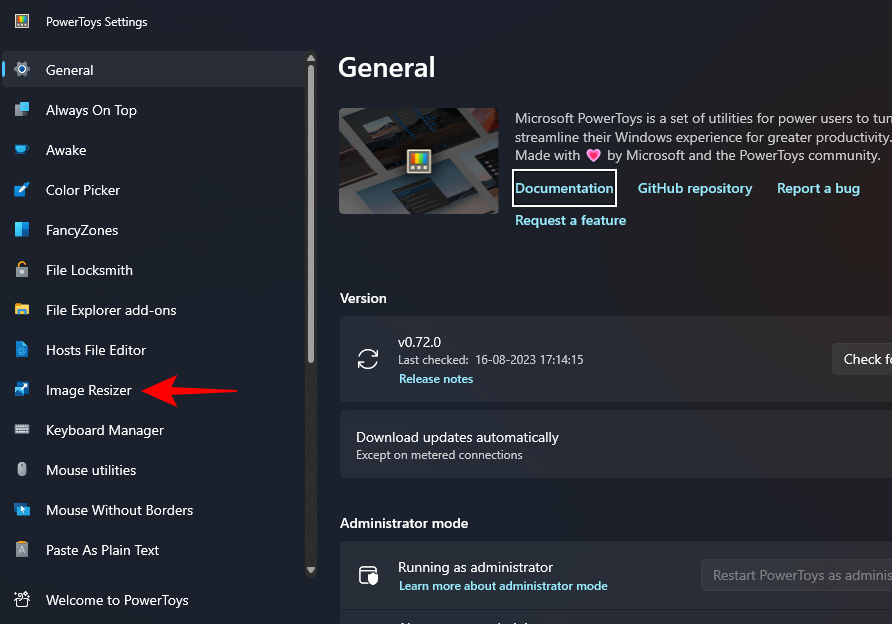
And make sure Enable Image Resizer is enabled on the right.
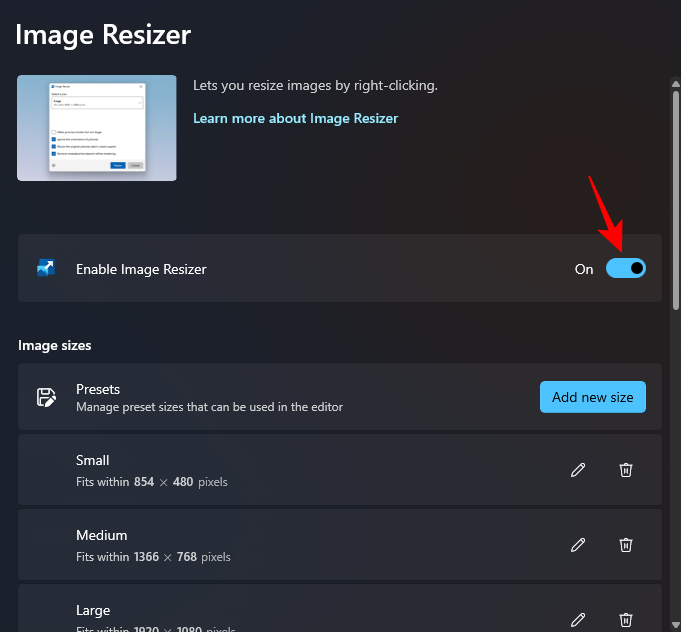
Step 2: Batch Resize Images
To start resizing images, navigate to the folder containing the images. Select all the images you want to resize, right-click on them and select "Resize Picture".
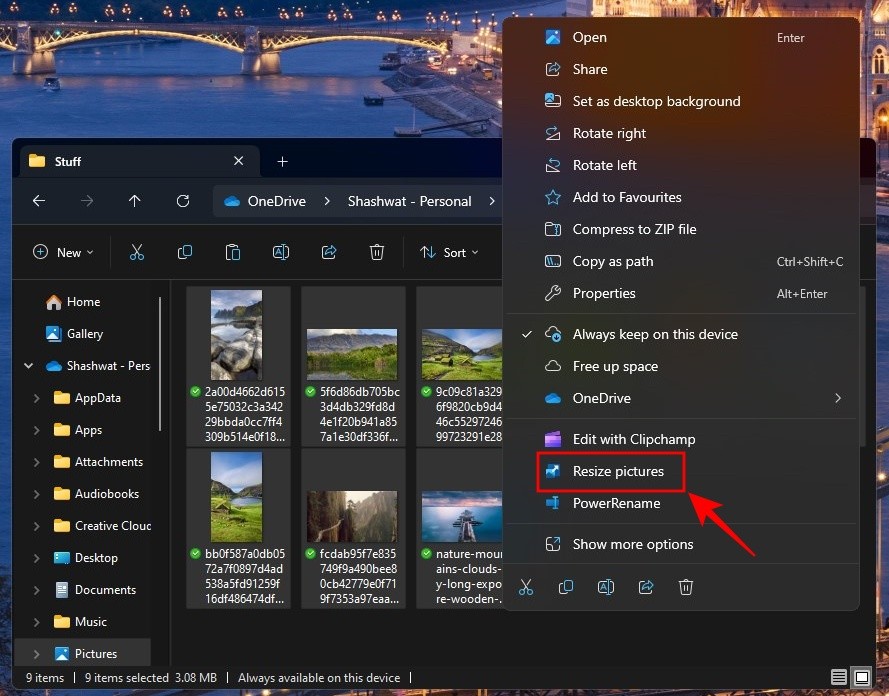
This will open the Image Resizer window. Click the drop-down menu under "Select a size."
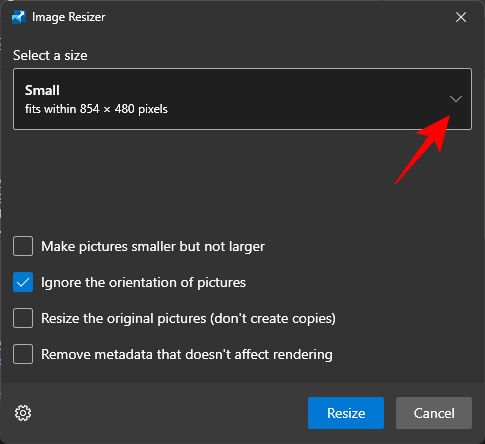
and choose from one of the available presets.
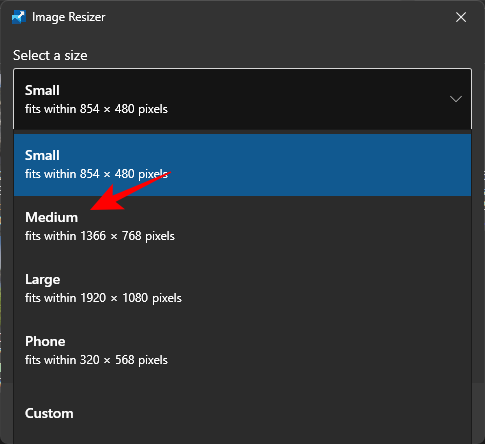
Note: All of these can be configured from within PowerToys for future use, so you can get your most used presets here. See next section for the same.
If the preset sizes don't meet your requirements, you can also choose a "custom" size if you have a specific image size in mind.
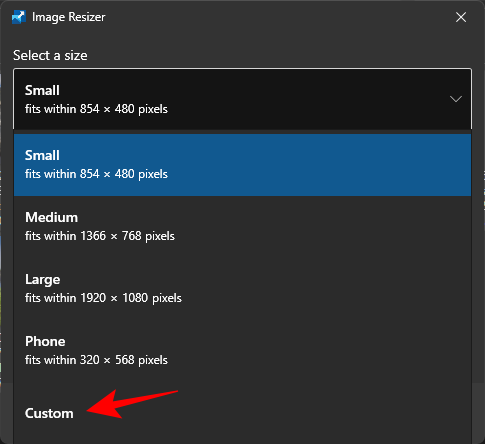
Then use its options to resize the image.
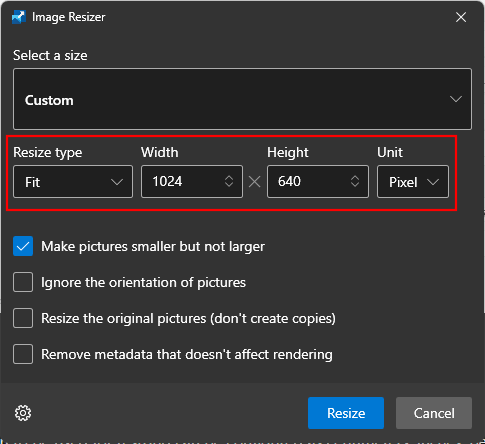
#The Image Resizer window will contain some additional options that you can enable or disable based on the image and how it is resized.
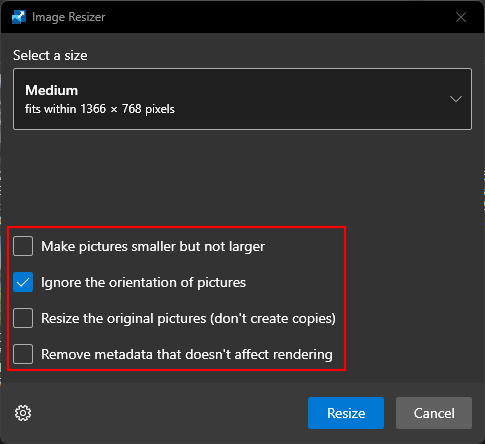
If some of the files are smaller than the selected image preset size, select "Make images smaller but not larger" so they don't change during the process. Got blurry and pixelated.
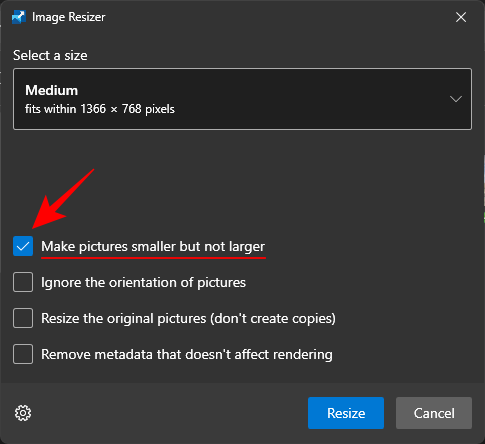
By default, the Ignore image orientation option is selected to ensure that all images are the same size regardless of their orientation. However, if some pictures are in portrait mode, this option may swap the height and width in the preset to match the orientation so that the smallest number in the preset is applied to the smallest size of the picture.
If you don't want this to happen, uncheck this option so the image doesn't distort to fit the preset in a disproportionate way.
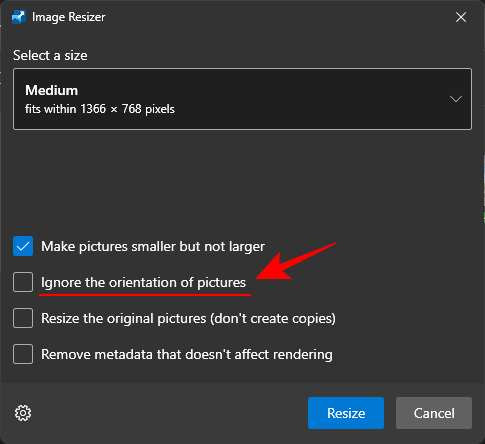
By default, Image Resizer creates a copy of an image file to resize it. This way your original file remains intact and retains its original size in case something goes wrong. Therefore, unless you are changing the original image file, leave the "Resize original picture (without creating a copy)" option unchecked.
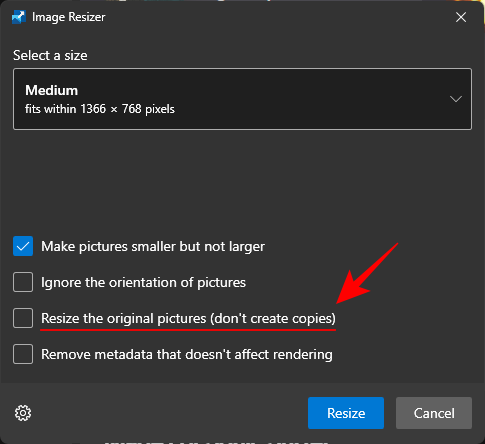
After setting your preferences, click Resize Size.
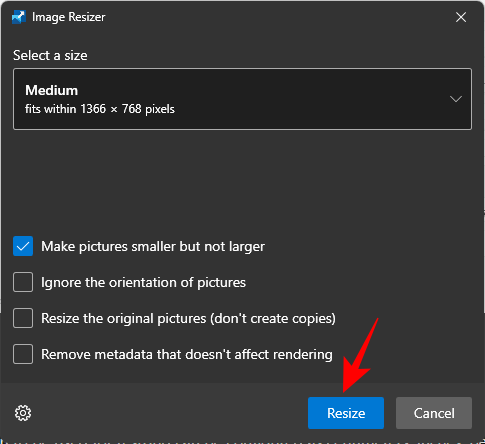
Custom Image Resizer: How to change its settings and preferences
The Image Resizer allows you to change the available presets or add one that better suits your needs New preset for preferences. This way, you can choose a custom preset without having to create a new one every time you want to resize an image. Here's how:
1. Add and change preset image sizes
Image Resizer has some size presets that you can use to quickly batch resize images. These are:
- Small – 854 x 480 pixels
- Medium – 1366 x 768 pixels
- Large – 1920 x 1080 pixels
- Phone – 320 x 568 pixels
Each of these can be edited or deleted as desired.
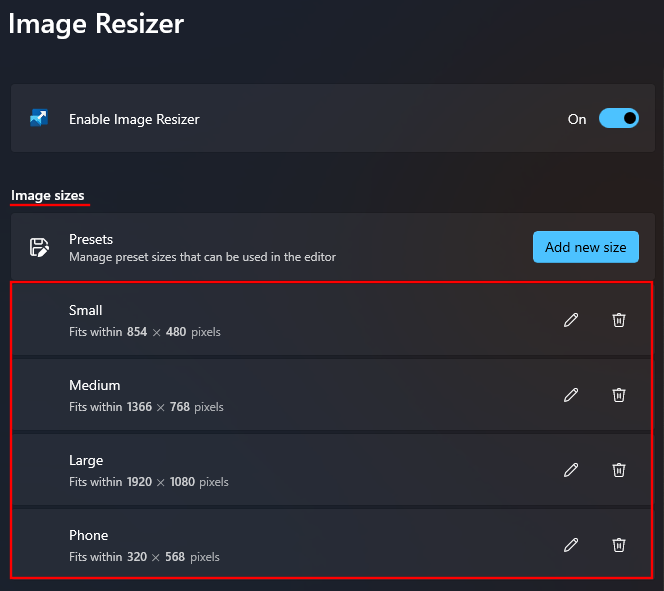
1.1 – Edit Image Size Presets
To edit one of the default presets, click the pencil icon next to it.
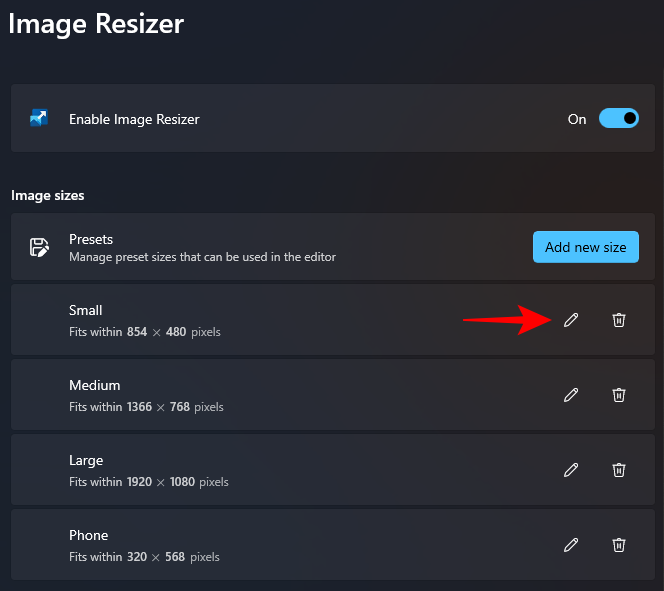
Change the name as needed.
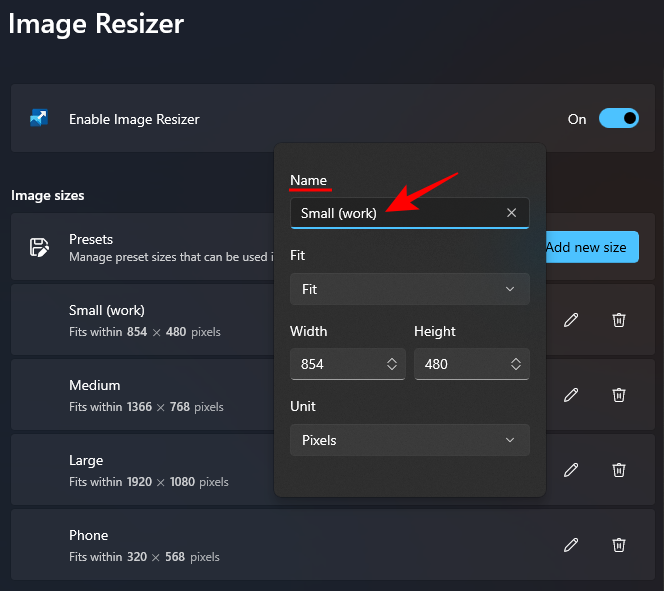
Then, click the Fit drop-down menu to configure how the image is scaled.
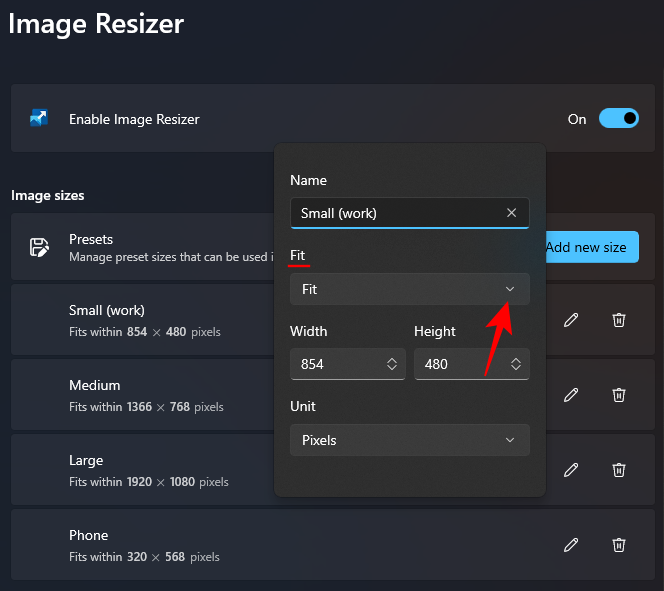
#The Fill option will fill the specified dimensions with the image, cropping it if necessary. The default option "Fit" does not crop the image and fit the image to size. And "Stretch" will fill the specified dimensions with the image. It does not crop the image, but may cause disproportionate scaling.
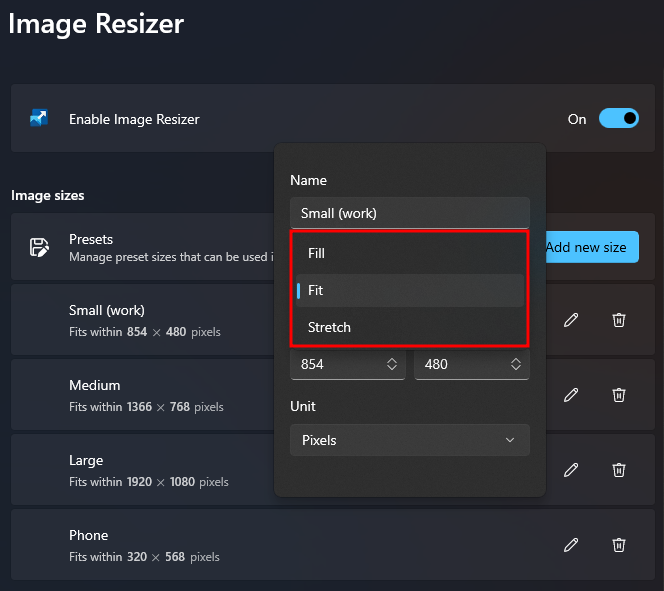
#If you're not sure which one to choose, stick with the default "Fit" option.
1.2 – Specify the resize size
Next, enter the width and height of the final output of the resized image. Use the arrows or enter the dimensions manually.
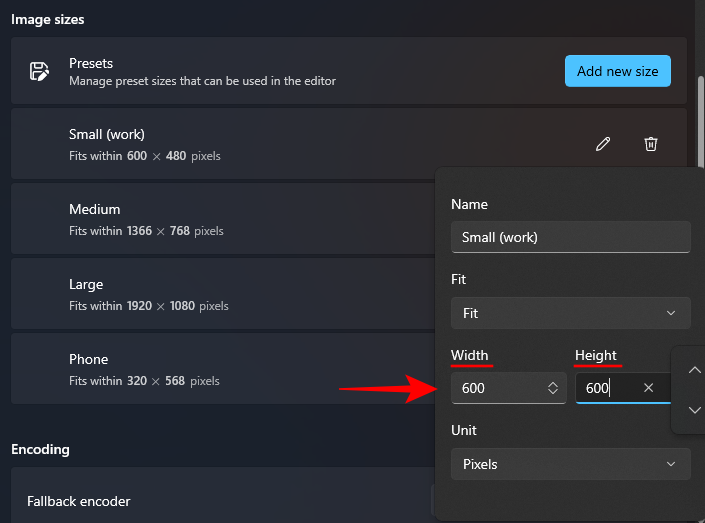
#To enter dimensions in different units, click the Units drop-down menu.
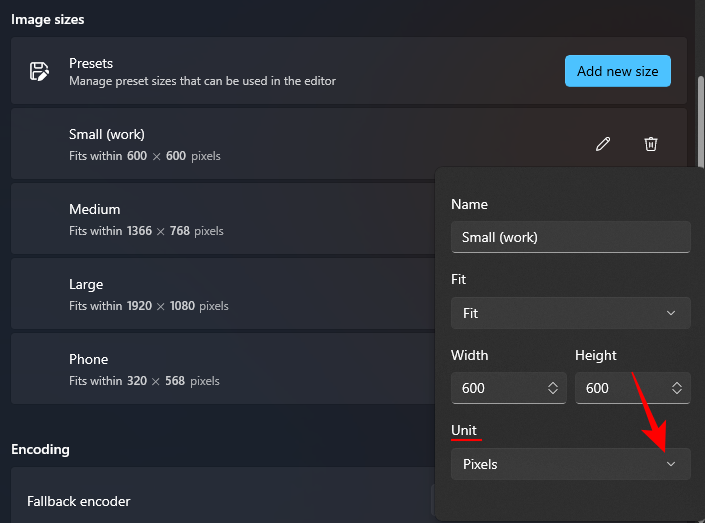
and select your unit.
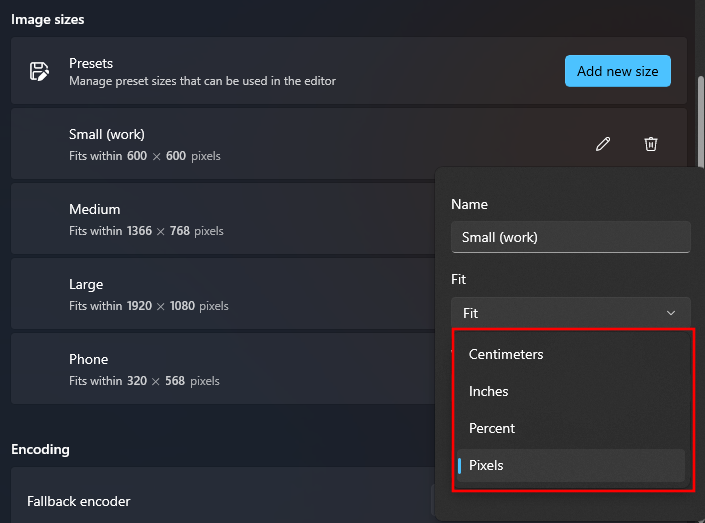
Ideally, it's best to stick to pixel units, as that's what you'll mostly see in the file description.
1.3 – Add New Image Size Presets
Image Resizer already provides you with four presets for you to use. However, if you want a different preset, you can add one by clicking Add New Size.
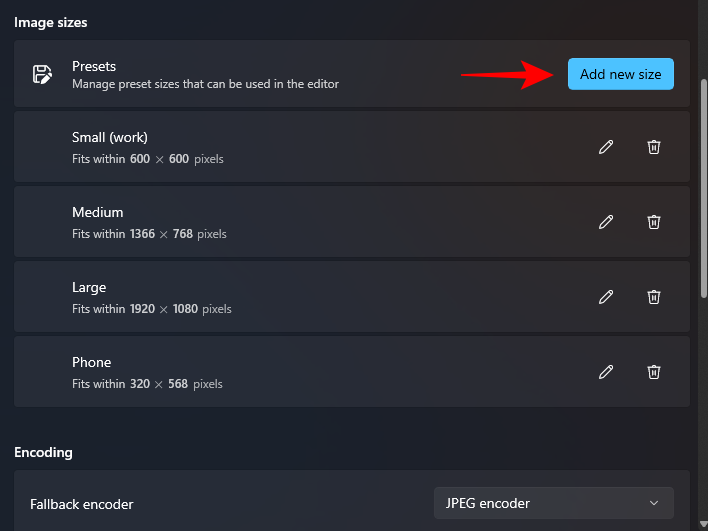
It will be added to the preset list. Click the pencil icon next to it to start editing.
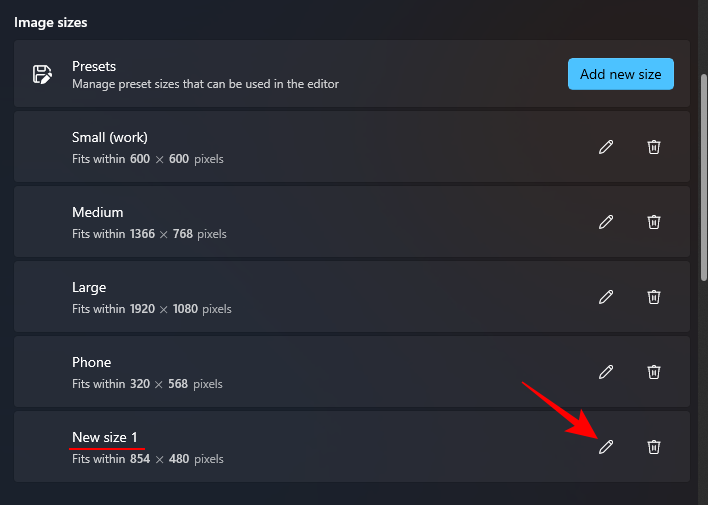
You will be able to make changes to the preset settings as shown previously.
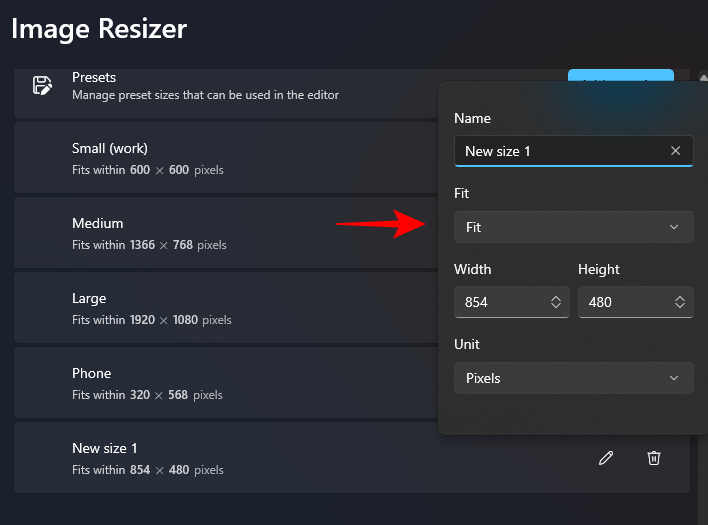
2. Change image encoding settings
Image resizer allows you to change the image quality percentage or add a fallback encoder in case the output image fails to match the original format, such as a Windows Meta file.
To change the fallback encoder, click the drop-down menu next to the fallback encoder.
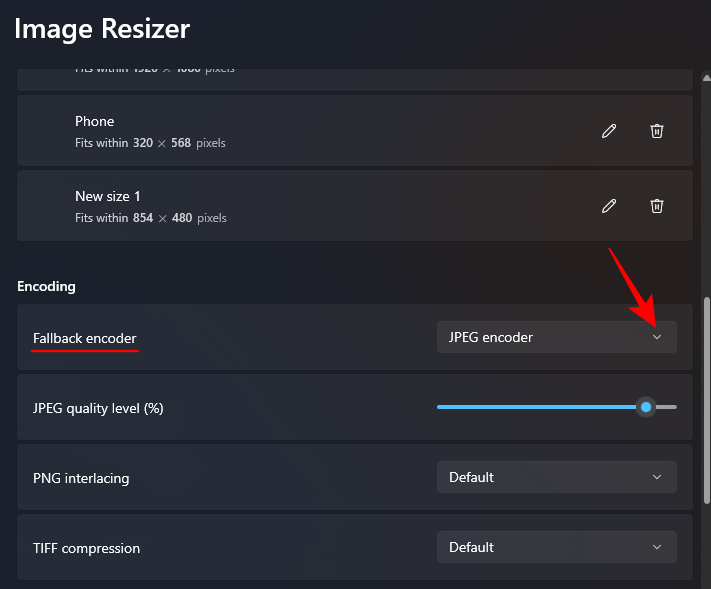
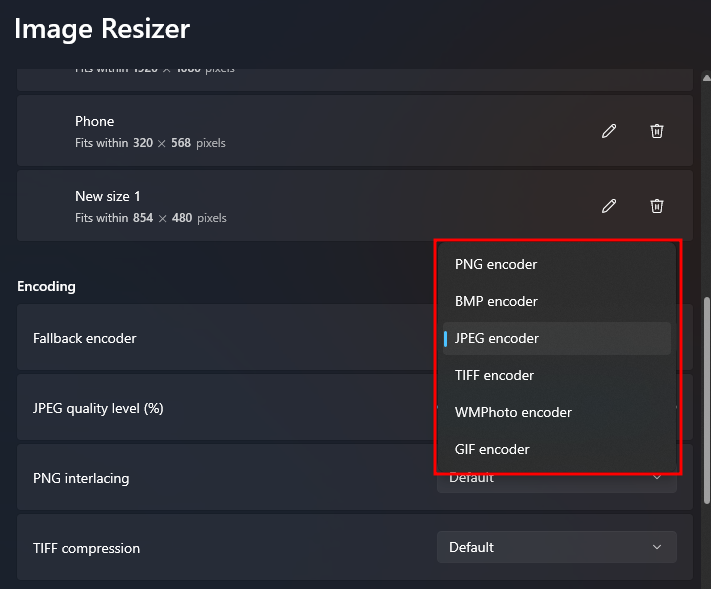
Next, use the slider next to JPEG Quality Level (%) to change the quality of the output file relative to the original file.
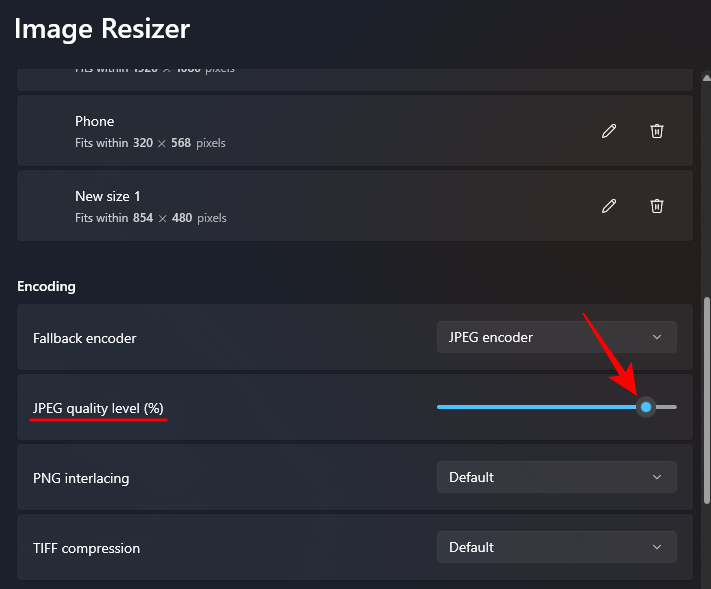
This comes in handy when you wish to reduce the file size.
3. Select file name format and timestamp
By default, the resized file will get the name of the original file, followed by the size of the output file in parentheses. So, for example, a file named "Image" resized using the "Medium" preset will be renamed "Image (Medium)".
This is determined by the filename format , where "%1 (%2)" is associated with the argument used for the filename.
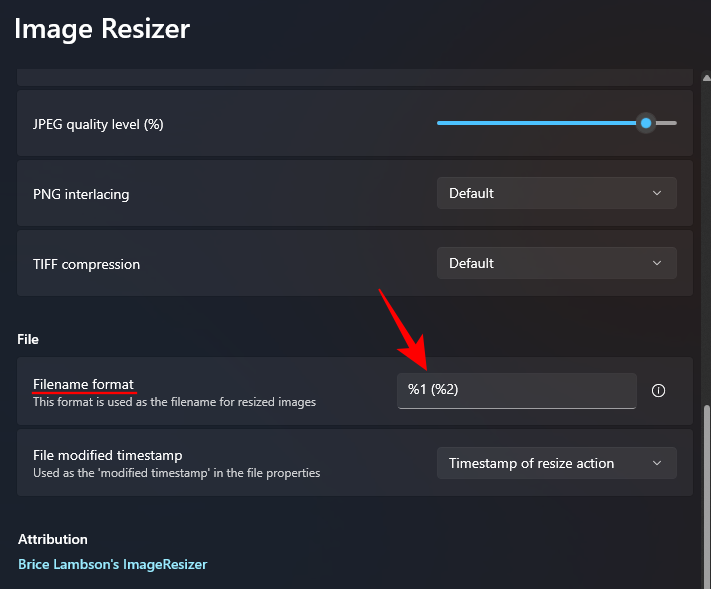
Click the information button (i icon) next to the Filename Format field to view the available parameters.
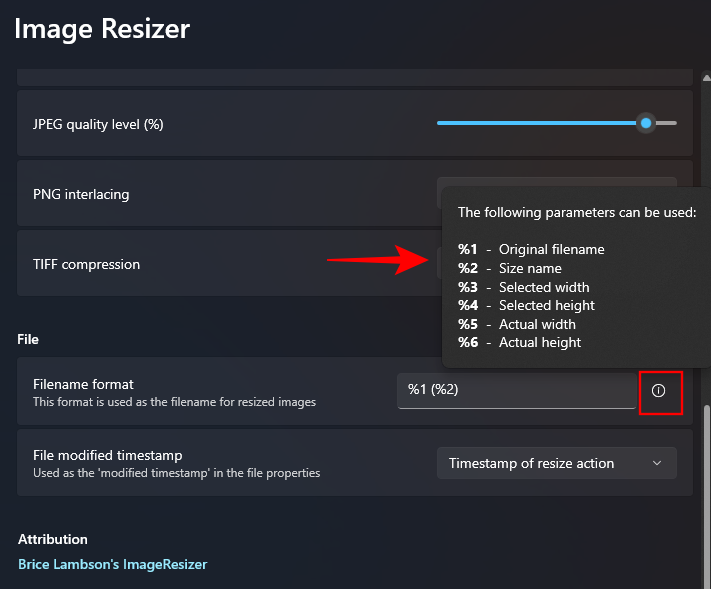
#To change how files are named, enter the parameters in the format of your choice. In the example below, we have included the original filename (%1), the preset (%2), and the new width (%3) and height (%4) as the filename of the resized image:
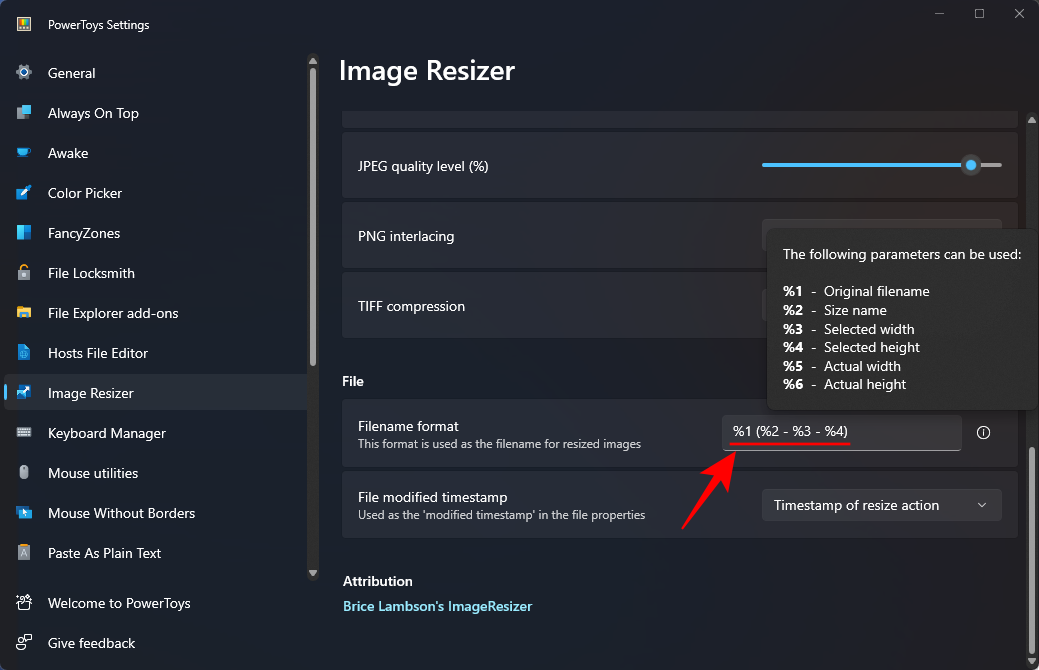
Finally, you can also change the timestamp of the resized file properties by clicking the drop-down menu next to "File Modification Timestamp".
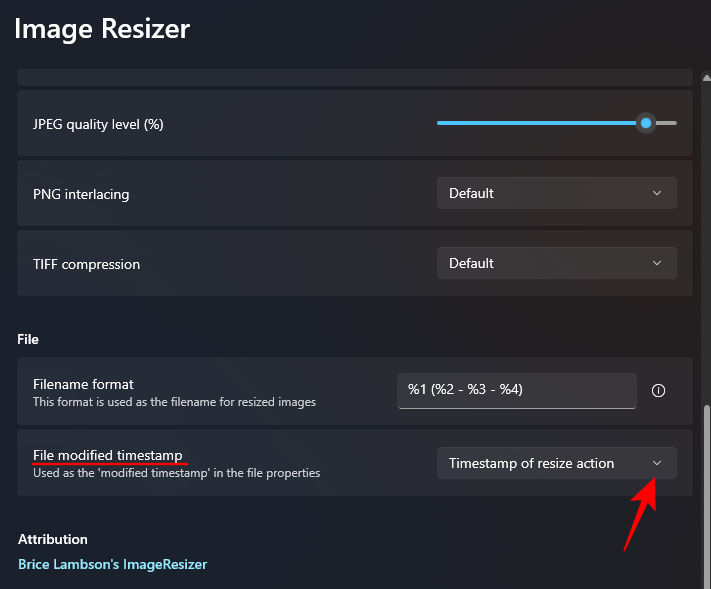
Choose between original file timestamps or resized files.
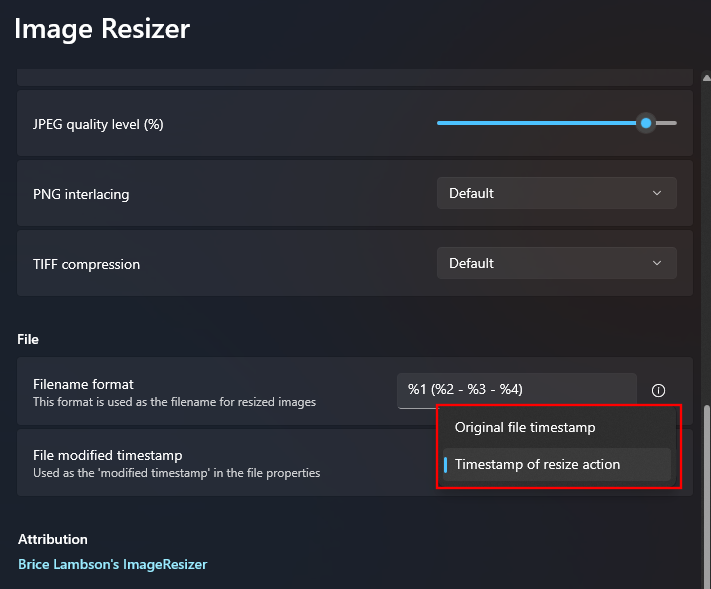
All changes to settings and preferences are applied immediately. So once you're done, Image Resizer will use these settings when you resize your image.
FREQUENTLY ASKED QUESTIONS
Let’s consider some frequently asked questions about batch resizing images using PowerToys.
Will fallback encoding convert image files?
No, the fallback encoding option in the image resizer is not a file converter. As the name suggests, it only allows image resizers to fall back to another encoder, such as JPEG, if the original file is not supported.
How to undo an image resized using PowerToys?
To undo an image resize done through PowerToys, simply press the folder containing the resized image. However, this only works if resizing the file is the last task you perform. If you perform any operations afterwards or return to the same resized file later, simple undo will not work. Ctrl ZCtrl Z
The above is the detailed content of How to batch resize images using PowerToys on Windows. For more information, please follow other related articles on the PHP Chinese website!

Hot AI Tools

Undresser.AI Undress
AI-powered app for creating realistic nude photos

AI Clothes Remover
Online AI tool for removing clothes from photos.

Undress AI Tool
Undress images for free

Clothoff.io
AI clothes remover

AI Hentai Generator
Generate AI Hentai for free.

Hot Article

Hot Tools

Notepad++7.3.1
Easy-to-use and free code editor

SublimeText3 Chinese version
Chinese version, very easy to use

Zend Studio 13.0.1
Powerful PHP integrated development environment

Dreamweaver CS6
Visual web development tools

SublimeText3 Mac version
God-level code editing software (SublimeText3)

Hot Topics
 How to recover expired WeChat files? Can expired WeChat files be recovered?
Feb 22, 2024 pm 02:46 PM
How to recover expired WeChat files? Can expired WeChat files be recovered?
Feb 22, 2024 pm 02:46 PM
Open WeChat, select Settings in Me, select General and then select Storage Space, select Management in Storage Space, select the conversation in which you want to restore files and select the exclamation mark icon. Tutorial Applicable Model: iPhone13 System: iOS15.3 Version: WeChat 8.0.24 Analysis 1 First open WeChat and click the Settings option on the My page. 2 Then find and click General Options on the settings page. 3Then click Storage Space on the general page. 4 Next, click Manage on the storage space page. 5Finally, select the conversation in which you want to recover files and click the exclamation mark icon on the right. Supplement: WeChat files generally expire in a few days. If the file received by WeChat has not been clicked, the WeChat system will clear it after 72 hours. If the WeChat file has been viewed,
 Preparing for removal takes a long time in Windows 11/10
Feb 19, 2024 pm 07:42 PM
Preparing for removal takes a long time in Windows 11/10
Feb 19, 2024 pm 07:42 PM
In this article, we will introduce how to solve the problem of "Ready to delete" prompt when deleting files or folders in Windows system. This prompt means that the system is performing some background operations, such as checking file permissions, verifying whether the file is occupied by other programs, calculating the size of the item to be deleted, etc. We will provide you with some workarounds to ensure that you can successfully delete your files without waiting too long. Why does Windows take so long to delete files? The time it takes Windows to prepare a file for deletion is affected by a variety of factors, including file size, storage device speed, and background processes. A long or stuck "Preparing to delete" prompt may indicate insufficient system resources, disk errors, or file system issues. exist
 Photos cannot open this file because the format is not supported or the file is corrupted
Feb 22, 2024 am 09:49 AM
Photos cannot open this file because the format is not supported or the file is corrupted
Feb 22, 2024 am 09:49 AM
In Windows, the Photos app is a convenient way to view and manage photos and videos. Through this application, users can easily access their multimedia files without installing additional software. However, sometimes users may encounter some problems, such as encountering a "This file cannot be opened because the format is not supported" error message when using the Photos app, or file corruption when trying to open photos or videos. This situation can be confusing and inconvenient for users, requiring some investigation and fixes to resolve the issues. Users see the following error when they try to open photos or videos on the Photos app. Sorry, Photos cannot open this file because the format is not currently supported, or the file
 Can Tmp format files be deleted?
Feb 24, 2024 pm 04:33 PM
Can Tmp format files be deleted?
Feb 24, 2024 pm 04:33 PM
Tmp format files are a temporary file format usually generated by a computer system or program during execution. The purpose of these files is to store temporary data to help the program run properly or improve performance. Once the program execution is completed or the computer is restarted, these tmp files are often no longer necessary. Therefore, for Tmp format files, they are essentially deletable. Moreover, deleting these tmp files can free up hard disk space and ensure the normal operation of the computer. However, before deleting Tmp format files, we need to
 How to transfer files from Quark Cloud Disk to Baidu Cloud Disk?
Mar 14, 2024 pm 02:07 PM
How to transfer files from Quark Cloud Disk to Baidu Cloud Disk?
Mar 14, 2024 pm 02:07 PM
Quark Netdisk and Baidu Netdisk are currently the most commonly used Netdisk software for storing files. If you want to save the files in Quark Netdisk to Baidu Netdisk, how do you do it? In this issue, the editor has compiled the tutorial steps for transferring files from Quark Network Disk computer to Baidu Network Disk. Let’s take a look at how to operate it. How to save Quark network disk files to Baidu network disk? To transfer files from Quark Network Disk to Baidu Network Disk, you first need to download the required files from Quark Network Disk, then select the target folder in the Baidu Network Disk client and open it. Then, drag and drop the files downloaded from Quark Cloud Disk into the folder opened by the Baidu Cloud Disk client, or use the upload function to add the files to Baidu Cloud Disk. Make sure to check whether the file was successfully transferred in Baidu Cloud Disk after the upload is completed. That's it
 What to do if the 0x80004005 error code appears. The editor will teach you how to solve the 0x80004005 error code.
Mar 21, 2024 pm 09:17 PM
What to do if the 0x80004005 error code appears. The editor will teach you how to solve the 0x80004005 error code.
Mar 21, 2024 pm 09:17 PM
When deleting or decompressing a folder on your computer, sometimes a prompt dialog box "Error 0x80004005: Unspecified Error" will pop up. How should you solve this situation? There are actually many reasons why the error code 0x80004005 is prompted, but most of them are caused by viruses. We can re-register the dll to solve the problem. Below, the editor will explain to you the experience of handling the 0x80004005 error code. Some users are prompted with error code 0X80004005 when using their computers. The 0x80004005 error is mainly caused by the computer not correctly registering certain dynamic link library files, or by a firewall that does not allow HTTPS connections between the computer and the Internet. So how about
 What is hiberfil.sys file? Can hiberfil.sys be deleted?
Mar 15, 2024 am 09:49 AM
What is hiberfil.sys file? Can hiberfil.sys be deleted?
Mar 15, 2024 am 09:49 AM
Recently, many netizens have asked the editor, what is the file hiberfil.sys? Can hiberfil.sys take up a lot of C drive space and be deleted? The editor can tell you that the hiberfil.sys file can be deleted. Let’s take a look at the details below. hiberfil.sys is a hidden file in the Windows system and also a system hibernation file. It is usually stored in the root directory of the C drive, and its size is equivalent to the size of the system's installed memory. This file is used when the computer is hibernated and contains the memory data of the current system so that it can be quickly restored to the previous state during recovery. Since its size is equal to the memory capacity, it may take up a larger amount of hard drive space. hiber
 How to install GHO files
Feb 19, 2024 pm 10:06 PM
How to install GHO files
Feb 19, 2024 pm 10:06 PM
The gho file is a GhostImage image file, which is usually used to back up the entire hard disk or partition data into a file. In some specific cases, we need to reinstall this gho file back to the hard drive to restore the hard drive or partition to its previous state. The following will introduce how to install the gho file. First, before installation, we need to prepare the following tools and materials: Entity gho file: Make sure you have a complete gho file, which usually has a .gho suffix and contains a backup





